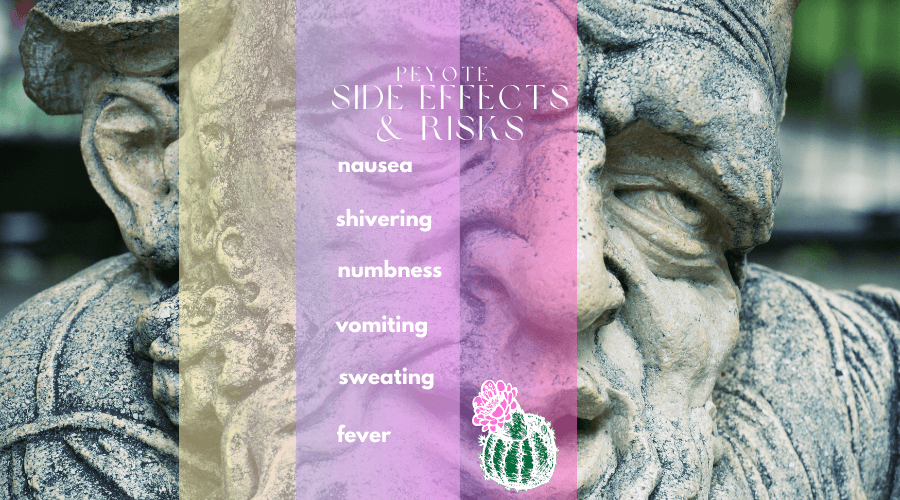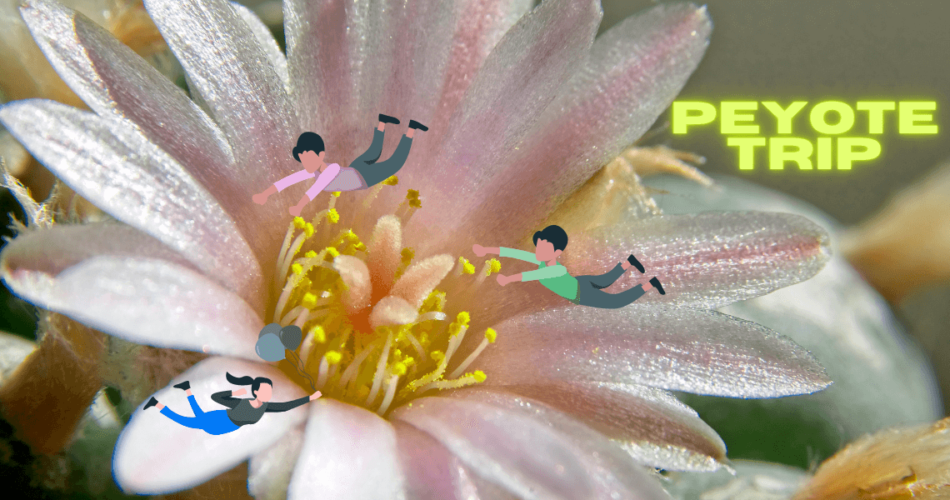Too Long; Didn’t Read
- Peyote is a cactus containing mescaline. It’s often found in the spotlight at trippy parties and solemn spiritual shindigs. How’s that for a thorny acquaintance! 🌵
- Peyote’s effects come in all shapes and sizes (very often in a literal sense). Think hyper HD, surround sound, color-bursting hallucinations that might leave you convinced you’ve had a conversation with your mailbox. 💫
- But it doesn’t come with only rainbows and unicorns. Ever experienced anxiety or paranoia? Well, imagine that, but you’re also seeing the walls breathe. Definitely puts a damper on the ‘fun’ part, doesn’t it? 🙀
- Peyote and mescaline aren’t some fun stuff lying around in the gray area. They are chilling on the top shelf, along with the likes of heroin and cocaine, on the Schedule 1 controlled substances list. 😿
- But there’s a plot twist! The Native American Church pulled a legal ninja move and won a religious exemption for peyote. Their response? Prayers of gratitude and, perhaps, a little more of the prickly stuff. 🙏
- Last but not least, the peyote trip is like a round-trip ticket on the Trans-Siberian Psychedelic Express. It’s a transformative journey that fiddles with your perceptions and cranks up the volume on your emotions. Not your average Sunday drive, folks! ✨
How to Use Peyote Safely?
Peyote is a big league hallucinogenic cactus. Safety should be your mantra, your guiding star, your… well, you get the gist. This ain’t no party piñata, but a powerful prickly pear that needs some serious TLC and respect.
- Getting chummy with peyote needs a peaceful and controlled playground. And we strongly recommend playing ‘follow the leader’ with someone who’s been down the rabbit hole and back (preferably in one piece).
- Forewarned is forearmed. Being aware of the technicolor trip isn’t enough. Prepare for the dark side too – think bad trips and your worst fears coming alive.
Now, for the party-pooper part. Under federal law, the recreational use of peyote is illegal. What does it mean for you? Well, there’s no safe peyote use when it can land you in the hands of the police (or a prison guard).
But peyote is not illegal for all citizens. You see, the Native American Church actually won a religious exemption. Thus, the only, truly safe way to take peyote in the U.S. is during a religious ceremony.

Why Is Peyote Illegal? Is It That Potent?
Why is peyote illegal in the U.S.? It’s a classic story of “it’s complicated” relationship status! Like that ex you just can’t forget, peyote has a long and tangled history with American law.
You see, the power-packed cactus, peyote, contains mescaline, a psychoactive compound that sends you on a magical mystery tour of the mind. (It’s like Alice’s Wonderland in a plant!) But as we all know, with great power comes great… legality issues. Uncle Sam classifies peyote as a Schedule I substance. That means it’s considered to have a high potential for abuse and no accepted medical use (in most contexts). The plot twist? Most psychedelics aren’t even addictive.
The Potential Effects of Peyote
When you use peyote, you’re actually experiencing the effects of mescaline. Once in the system, it interacts with serotonin, a key neurotransmitter in our brain, causing an array of hallucinations, both auditory and visual. But not all at once.
The psychedelic effects of peyote usually start after an hour or so of ingestion. Before that, you will feel relaxed, and maybe a bit spacey. Once it kicks in, it can last several hours (even up to 12 hours!).
However, as with all psychedelics, the effects can be unpredictable and may lead to unpleasant experiences, or ‘bad trips’. Flashbacks are also possible. Normally, you’d get a glimpse into the trip you had, and that’s all. Some people, though, get them frequently, at random, and in a more scary style. Pretty yikes.
Peyote Ceremonies
Native Americans have long used peyote in religious ceremonies. These rituals often involve a night-long peyote trip, leading to deeply spiritual and transformative experiences for participants. In these ceremonies, the influence of peyote goes beyond mere hallucination, providing insights into one’s self and the cosmos.
Fun Fact ✨
Peyote has been used for over 5,500 years by indigenous tribes in Mexico and Texas, making it one of the oldest known hallucinogens!
What Does a Peyote Trip Look and Feel Like?
So, what exactly does a peyote trip feel like? It’s a bit like being thrust into a vivid, pulsating world of colors, shapes, and sounds that you never knew existed! But it’s more than just the sensory feast; it’s an emotional and introspective journey, too. Many report feeling a deep interconnectedness with the world around them, leading to profound self-reflection and heightened empathy.
How Does the Comedown Look Like?
Coming down from a peyote trip can be an equally intense experience. Users may experience fatigue, along with lingering psychological effects. The ‘re-entry’ into the ‘normal’ world might feel jarring, given the intense experiences just undergone. It’s important to take the time to rest, hydrate, and process the experience.
Peyote and Mental Health: A Double-Edged Sword
While some find their peyote trip therapeutic, leading to personal growth and enhanced self-understanding, others may not fare so well. The experience can trigger anxiety and paranoia, especially in those with a history of mental health issues. A phenomenon known as ‘flashbacks,’ where users relive their peyote trip days or even weeks later, can also occur.
There you have it, folks! A peyote trip is certainly a wild ride, full of dazzling highs and potential lows. So, as with all mind-altering substances, tread lightly, stay informed, and keep safe. Until our next psychedelic adventure, happy tripping!
Similar Posts:
- Is San Pedro Cactus Legal? The Legality of Echinopsis Pachanoi
- Is Peyote Legal? Can You Cultivate It? | The Legal Status of Peyote
- Mescaline vs Peyote Cactus: A Short Comparison
- How Long Does Peyote Last? Duration of a Mescaline Trip
- The Marvel of Echinopsis Peruviana: Meet the Peruvian Torch Cactus, San Pedro and Peyote’s Mescaline Cactus Cousin
- How Much Is Peyote Worth? Cactus Controversial?
- San Pedro Cactus (Echinopsis Pachanoi) 🌵 All You Need to Know

